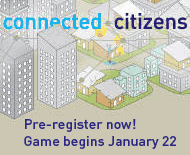Future Now
The IFTF Blog
Smart Cities: Crucibles of Citizen-Government Co-creation
"What if mayors ruled the world?" asked political scientist Ben Barber in a recent Long Now talk in San Francisco. All over the world, local governments have stepped to (or been pushed to) the forefront of innovation in government and the delivery of public services. But why now?
Look at any trend in global urban development and the answer is clear. We are becoming an urban species, and doing so alarmingly fast. In the span of about 10 human generations, the two centuries spanning 1900-2100, the world's population will have grown more than six-fold from about 1.6 billion to as many as 10 billion. But the number of poeple living in cities will have grown even faster, some 40 times or more from just over 200 million to as many as 8 or 9 billion. We're about halfway through this process - which means that in the next century we'll build as much urban fabric as we have in the entirety of human settlment stretching back about 6,000 years.
Yet in the face of this massive challenge, complicated by the need to build and rebuild far more energy-efficient cities than we ever have in the past, we have an enormous new toolkit. A phalanx of global tehcnology and engineering companies such as IBM, Siemens, and Cisco Systems are deploying sophisticated control systems for everything from road networks to power grids. And mayors have eagerly embraced these new high-tech solutions, which effortlessly and intelligently manage the systems that maintain the flow of people, goods and resources through our communities.
But a more important question is: can mayors do it alone? And the answer here is equally obvious: no!
Because as much as new technologies for computer sensing, analysis and automation of urban infrastructure and services can do, the most valuable actuators in cities are its citizens, to paraphase Carlo Ratti, who directs MIT's SENSEable City Lab.
Smart cities aren't just fix-it shops where new information technologies come together with legacy infrastructure, they are crucibles where grassroots communities of innovators can co-create new services through participation that runs the gamut from simply clicking "like," to reporting issues like broken streetlights, to actively organizing crowdsourced responses to larger community needs.
So what if together we could imagine hundreds of civic innovations to improve communities and government services?
The Institute for the Future's upcoming Foresight Engine experiment, Connected Citizens, is a one-of-a-kind, 24-hour collaborative forecasting game produced by the Institute for the Future’s Governance Futures Lab. Gameplay begins January 22 at 12pm PST and ends January 23 at 12pm PST. Using IFTF’s Foresight Engine, you’ll exchange ideas with hundreds of social inventors and creative thinkers from around the world about the technologies, dynamics, and dilemmas generated in this new world of connected citizenship.
Pre-register now:




